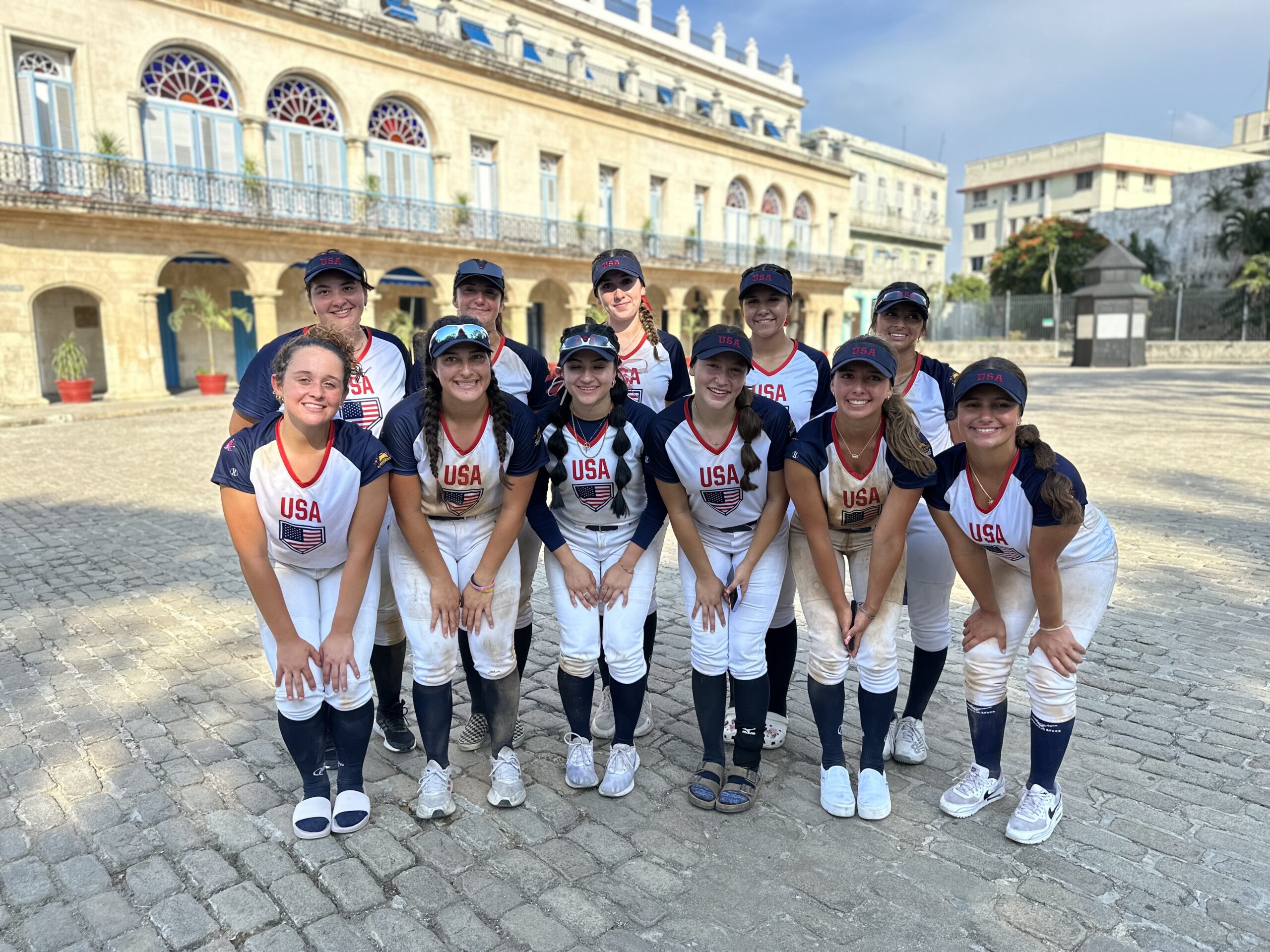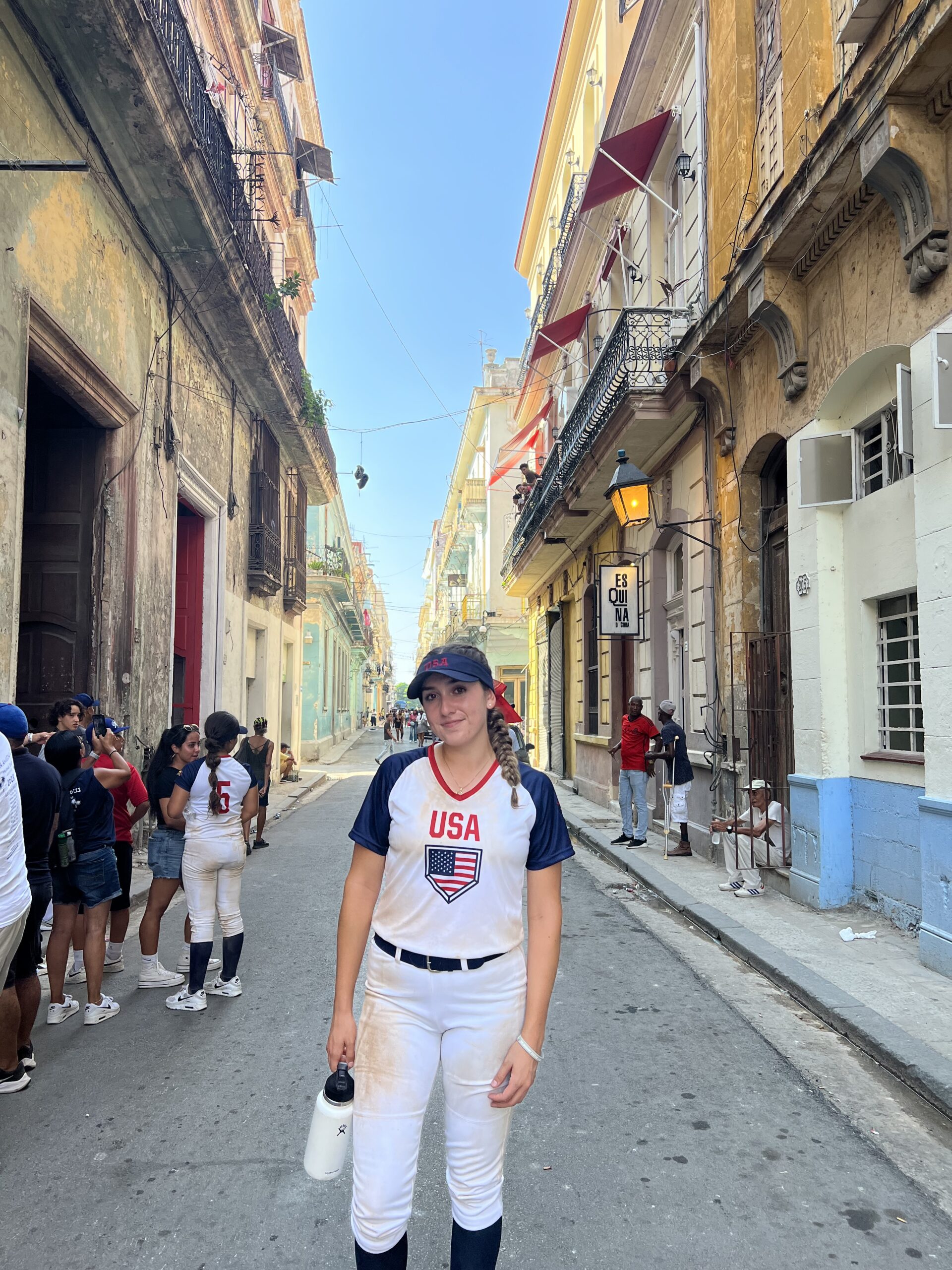
By Rick Assad

Situated just 90 miles from Florida, Cuba is both mysterious and beautiful and was also a forbidden island where it seemed to exist in a vacuum.
Cuba’s elite athletes were numerous, and they number baseball players Yasiel Puig, Aroldis Chapman, and boxer Guillermo Rigondeaux, but many of the best never left including boxers Teofilo Stevenson, Feix Savon and sprinter Alberto Juantorena.
When Fidel Castro seized power of Cuba in 1959, and being a Communist country, American citizens were not allowed entry to the island nation of just over 11 million.
This would change in time, as the Baltimore Orioles, on March 28, 1999, played Cuba’s National Team in an exhibition game at Havana’s Estadio Latinoamericano. This was truly historic.
Earlier this month, ELLA Sports Foundation’s sports programs director Manny Travieso, the head softball coach at Providence High took a squad of eleven women travel ball players to Cuba to take part in the Third Annual Copa Amistad. They were in Havana, from August 1 through 6.
ELLA is a 501 (c) non-profit organization whose mission is to level the playing field for Latina and female athletes, providing resources and guidance to develop tomorrow’s women leaders via sports and academic excellence.
The team consisted of Providence’s Olyvia Rutter, Vic Leon, Rebecca Eckart, Isabella Slape, Sophia Marrero, Gloria Galindo, Kaylee Carrillo, Katie Cunane, Arden Miller, Savannah Gatewood and Annika Isaacson.
This marks the third time Travieso has been to Cuba and maybe it’s his best experience because there were so many highlights.

“Each day we were there was a highlight. On day one, we got to play two games against the Cuban National Team (we lost both games) and then visited Old Havana. On day two, we played two mixed games, meaning half of the National Team played for us and half of our players played with them,” he said. “These games were very close, and we ended up winning both. Afterward, we visited “new” Havana. On this day, I personally got a surprise. I was presented with an Acknowledgment Award and a beautiful National Team Jersey.”
Travieso added: “Day three took us to Varadero Beach, a famous beach about three hours away from Havana, providing an unforgettable trip as we drove through Cuban cities. Day four was filled with visits to landmarks and museums, but the visit to [Ernest] Hemingway’s mansion was yet another unforgettable experience,” he noted. “Not only did we have the opportunity to see the place he left to the Cuban people, but we also stumbled upon a pickup baseball game at the entrance of his estate, something he allowed to take place when he was alive. Our team decided to join in, and we were invited to play. Watching our amazing female athletes play baseball with old baseballs and have fun with the kids in a sandlot-style game was truly amazing.”
Travieso recounted what made this visit special compared to the two previous.
“This trip was truly unique. Cuba is a time capsule, with old Spanish architecture and cars from the 1940s roaming the streets. In 2017, I became the first-ever USA travel ball coach to be invited to take a team to play against the Cuban National Team. During that time, President [Barack] Obama held office, and the relations between our countries and their people “seemed” positive. However, when I returned in 2018, with President [Donald] Trump in power, there was a noticeable anti-American sentiment from the government, though not necessarily from the Cuban people,” he said. “This was evident through numerous billboards stating, “The US embargo is the biggest genocide in the history of humanity.” Now, during my third visit, those billboards are gone. For the first time ever, many people have cell phones, providing easy access to information in the palm of their hands. The Cuban people are more vocal about their hardships and current dislikes, a stark contrast to the past when expressing such opinions could lead to jail time or worse.”
Travieso said the Cuban people are wonderful and a giving sort.

“The embargo is definitely working, but it’s hurting the wrong people. Sadly, food is scarce. People are begging on the streets, something never before seen,” he said. “They are hungry, and things are getting worse by the day. Despite all of this happening, the Cuban people still try to smile and treat tourists and foreigners with the utmost respect.”
Rutter played first base and pitches for the Pioneers and had the time of her life.
“I had the best time ever. It was an incredible experience that I will never forget,” she said. “The USA Team played against the Cuban National Team as well as the Cuban Junior National Team, and we faced tough competition.”
Rutter was thrilled to be selected and knows just how fortunate she was to be a member of this team.
“I love learning from the players and their coaches. We were able to mix players from our team and both of the Cuban teams,” she said. “It was so much fun being able to play on the field with the Cuban players, learn some words that they use on the field and bond with them.”
The games were the reason the team was in Havana, but it was also an opportunity to see firsthand a different culture and land.
“My favorite part of the trip was giving the Cuban players the care packages that we made for them as well as some of our own gear,” Rutter noted. “It was amazing seeing their faces light up when I gave them my bat, batting gloves, belt, helmet, reusable water bottle, and even some protein bars and hydration packets.”
Rutter is truly thankful for this once-in-a-lifetime opportunity.
“It was truly a great experience,” she pointed out. “I feel so lucky and privileged to have been selected to participate in the Copa Amistad because it made me so happy to see the Cuban players so excited about all the new things they received and that they were in need of.”
Rutter’s mother, Adreana Ramirez-Rutter, accompanied her daughter to Cuba and was equally thrilled.
“Going to Cuba was a once in a lifetime, incredible experience for my daughter Olyvia,” she said. “It puts a lot of things into perspective, such as acknowledging the privileges we have here in the United States, as far as access to the things that are very easy for us to get, like toilet paper, water, a variety of foods, and unlimited times we can go to the market.”
Ramirez-Rutter could see the difference between the two nations.
“We learned to genuinely appreciate what we have, as we acknowledged the difficulties of the Cuban people who were so kind and nice during the time we were there,” she said. “Olyvia learned a lot from the Cuban National Team. They are competitive on the field and the love for softball is the same as hers.”

Rutter’s mother was moved by the expression of gifts.
“There was a day where the teams mixed players, some of the Cuban players played with the USA Team and some of the USA players played with the Cuban National Team and they competed against each other,” she said. “It was great to see all players practice and play together. After the last game, the USA players handed out care bags with personal items in the bags. All the Cuban players were extremely excited. During the exchange they looked in the bags with big, huge smiles.”
Rutter continued: “That was one of the best parts. While both teams were taking pictures with each other, Olyvia donated her softball bat, helmet, batting gloves, softball belt and her USA Jersey to the Cuban players who asked for these items from her,” she said. “Some of the Cuban players had torn batting gloves. They did not have a bat, a belt, nor their own individual helmet. I loved seeing Olyvia run to the dugout to get these items without hesitation and give them to the players who asked for them. She took off her USA Jersey right there on the field and gladly gave it to them. Seeing this really brought tears to my eyes, how legitimately happy and excited everyone was. It was an experience we will never forget, and if it came up again, we would jump at the chance to go back again.”
Though the visit was only a few days, it will be something everyone involved will never forget.
